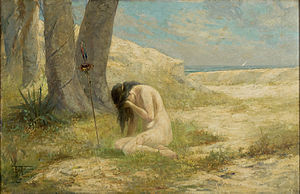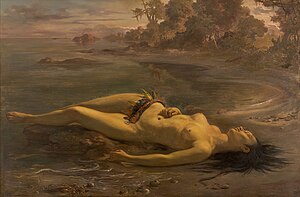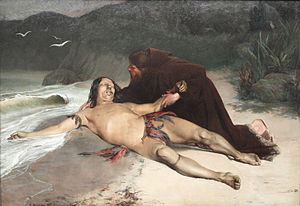
Summary
Indianism (Portuguese: Indianismo) is a Brazilian literary and artistic movement that reached its peak during the first stages of Romanticism in the country, though it had been present in Brazilian literature since the Baroque period.
   Iracema by Antônio Parreiras (1909); Moema by Victor Meirelles (1866); The Last Tamoio by Rodolfo Amoedo (1883) |
In Romantic contexts, it is called "the first generation of Brazilian Romanticism", being succeeded by the "Ultra-Romanticism" and the "Condorism".
Historical context edit
After the independence of Brazil from Portugal in 1822, a heavy wave of nationalism spread through the Brazilian people. Inspired by this, poets and writers began to search for an entity that could represent and personify the newly created Brazilian nation.[1]
Since there was no Middle Ages in Brazil, it could not be the knight, as in the European chivalric romances; it could not be the Portuguese man either, since Brazilians still held resentment for the years of colonization;[2] it could not be the black man either, since the mentality of the time did not allow it. Influenced by Enlightenment ideals, especially works by Jean-Jacques Rousseau and the "noble savage" archetype, the authors chose the Brazilian Indian to represent the new nation.
Characteristics edit
Indianist works are characterized by always having an Indian as the protagonist. The poetry is very patriotic and nationalistic, exalting Brazilian fauna, flora, riches and people.
Major proponents edit
Literature edit
Baroque edit
- José de Anchieta (1534–1597)
Neoclassicism edit
- Basílio da Gama: O Uraguai (1740–1795)
- Santa Rita Durão: Caramuru (1722–1784)
Romanticism edit
- José de Alencar: novels O Guarani, Iracema and Ubirajara (1829–1877)
- Gonçalves Dias: narrative poem I-Juca-Pirama, epic poem Os Timbiras, and poetry books Primeiros Cantos, Segundos Cantos and Últimos Cantos (1823–1864)
- Gonçalves de Magalhães: epic poem A Confederação dos Tamoios (1811–1882)
Arts edit
- Victor Meirelles (1832–1903)
- Rodolfo Amoedo (1857–1941)
- Antônio Parreiras (1860–1937)
See also edit
References edit
- ^ Braga, Duarte; Garmes, Hélder (December 2016). "Indianisms in Brazilian and Goan poetry: The cases of Gonçalves Dias and Paulino Dias". Gragoatá. 21 (41). doi:10.22409/gragoata.2016n41a33426.
- ^ Lopes, Hélio; Bosi, Alfredo (1997). Letras de Minas e outros ensaios. São Paulo: Editora da Universidade de São Paulo. ISBN 978-85-314-0381-1.
Bibliography edit
- GRIZOSTE, Weberson Fernandes, A dimensão anti-épica de Virgílio e o Indianismo de Gonçalves Dias[permanent dead link], Coimbra, CECH, 2011.


